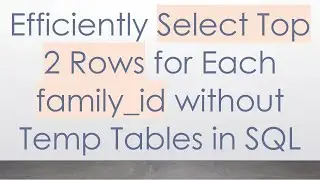Key Differences and Concerns between using JDBC and Hibernate in Web Applications
Explore the key differences, advantages, and concerns when choosing between JDBC and Hibernate for your Java-based web applications.
---
Disclaimer/Disclosure - Portions of this content were created using Generative AI tools, which may result in inaccuracies or misleading information in the video. Please keep this in mind before making any decisions or taking any actions based on the content. If you have any concerns, don't hesitate to leave a comment. Thanks.
---
Key Differences and Concerns between using JDBC and Hibernate in Web Applications
When developing Java-based web applications, a critical decision involves choosing the right data access technology. Two popular approaches are JDBC (Java Database Connectivity) and Hibernate. Each technology has its own set of advantages and concerns. Let's delve into the key differences and considerations that might influence your choice.
What is JDBC?
JDBC is a low-level Java API for connecting and executing queries on a database. It provides a set of interfaces and classes to perform CRUD (Create, Read, Update, Delete) operations directly.
Key Features of JDBC:
Direct Control: Developers have fine-grained control over SQL queries and database interactions.
Performance: Typically offers superior performance due to minimal abstraction.
Flexibility: You can execute arbitrary SQL queries and use custom SQL to optimize performance.
Concerns with JDBC:
Boilerplate Code: Requires extensive writing and maintenance of boilerplate code such as managing resources (connection, statement, result set).
Error Handling: Manual handling of SQL exceptions and transactions can lead to error-prone code.
Portability: Changing the underlying database often requires substantial code changes.
What is Hibernate?
Hibernate is an Object-Relational Mapping (ORM) framework that abstracts the database interactions, allowing developers to work with Java objects instead of SQL queries.
Key Features of Hibernate:
Simplicity: Reduces boilerplate code by handling database transactions, connection pooling, and resource management.
Object-oriented: Maps Java objects to database tables, making the development process more intuitive and aligned with object-oriented programming.
Database Independence: Allows easy database switching with minimal code changes through configuration.
Concerns with Hibernate:
Learning Curve: Steeper learning path due to complex configurations and understanding of concepts like session management and lazy loading.
Performance Overhead: Introduces an abstraction layer which, in some cases, can impact performance.
Complex Queries: May require native SQL or custom HQL (Hibernate Query Language) for complex queries, somewhat reducing the abstraction benefits.
When to Choose JDBC?
Use JDBC when performance is a critical factor and you need optimized, fine-tuned control over SQL.
Suitable for small projects where limited database interactions are involved.
Preferred when your development team has strong SQL expertise and you need to execute many specialized queries.
When to Choose Hibernate?
Ideal for large-scale projects that require complex data handling and frequent database interactions.
When you prioritize maintainability and developer productivity over minimal performance gains.
Suitable for applications where database independence and easy migration are essential.
In conclusion, both JDBC and Hibernate have their unique strengths and potential pitfalls. Choosing between the two comes down to project requirements, team expertise, and long-term maintenance considerations. Understanding these differences is key to making an informed decision tailored to your specific web application's needs.































